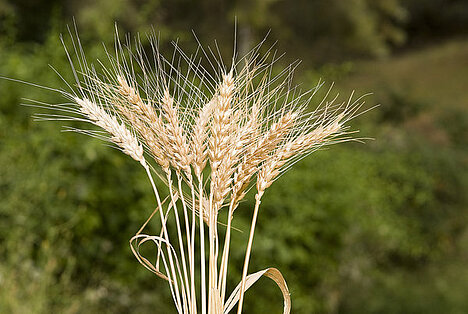Wholemeal wheat

Wholemeal wheat is a grain that consists of the whole grain of the wheat plant. It contains more fiber, vitamins, minerals and antioxidants than refined wheat, which consists only of the endosperm. Whole wheat can be eaten in various forms, for example as bread, pasta, muesli or flakes.
But is wholegrain wheat also good for dogs? In this article, you will find out the advantages and disadvantages of whole grain wheat for your four-legged friend and what you should look out for if you want to feed him this grain.
The benefits of whole grain wheat for dogs
Whole wheat has some health benefits for dogs that you shouldn't underestimate. For one, whole wheat can aid your dog's digestion as it is rich in fiber. Fiber can help regulate bowel movements, prevent constipation and increase satiety. Fiber can also have a positive effect on the intestinal flora and strengthen the immune system.
Wholemeal wheat can also improve your dog's energy supply as it contains complex carbohydrates. These are digested more slowly than simple carbohydrates and thus ensure a steady blood sugar level. This can help your dog stay active and productive for longer.
Finally, whole grain wheat can also optimize your dog's nutritional intake, as it contains many important vitamins, minerals and antioxidants. For example, whole wheat provides vitamins B1, B2, B3, B6 and E, iron, zinc, magnesium, potassium and phosphorus. These nutrients can support the function of various organs, promote cell health and fight free radicals.
The disadvantages of whole grain wheat for dogs
However, whole wheat is not suitable for every dog. There are some disadvantages that you should be aware of before feeding this grain to your dog. For one thing, whole wheat can trigger allergies or intolerances, which can manifest themselves in skin problems, itching, diarrhea or vomiting. If your dog is sensitive to wheat or gluten, it is better not to give him whole grain wheat or only in small quantities.
On the other hand, whole grain wheat can also lead to obesity or diabetes if it is fed in excessive quantities. Since whole wheat contains a lot of calories and carbohydrates, it can contribute to weight gain or insulin resistance if your dog does not get enough exercise or is already susceptible to these conditions. Therefore, you should always make sure to adjust the amount of whole grain wheat to your dog's energy needs and weigh him regularly.
How you can feed your dog whole grain wheat
If you want to feed your dog whole grain wheat, there are a few tips you should follow to get the best out of this grain. Firstly, you should always pay attention to the quality of the whole grain wheat and only buy products that contain no artificial additives or preservatives. Of course, it is best if you cook or bake whole grain wheat yourself and feed it fresh.
On the other hand, you should always pay attention to the amount of whole grain wheat and only give it as a supplement to your dog's main food. A rule of thumb is that no more than 10% of your dog's daily calorie intake should come from grain. This means that depending on your dog's size and activity level, you should only feed a small to medium portion of whole grain wheat per day.
Finally, you should always pay attention to your dog's reaction to whole grains and have them tested regularly. If you notice that your dog is showing signs of allergies, intolerances, obesity or diabetes, you should reduce or stop feeding whole grain wheat and consult a vet. This is the only way to ensure that your dog stays healthy and happy.
Whole wheat is a grain that can have many health benefits for dogs, but can also have some disadvantages. If you want to feed your dog whole grain wheat, you should always pay attention to the quality, quantity and your dog's reaction and not use it as the sole food. This way you can offer your dog a varied and balanced diet that is good for him.
If you notice any signs of hypersensitivity or poisoning in your dog, you should see your vet immediately. We are not a substitute for a vet, but we try to be as accurate as possible. Every dog reacts differently and we recommend you get a second opinion or consult your vet if in doubt.
Stay healthy and take good care of your four-legged friend!😊